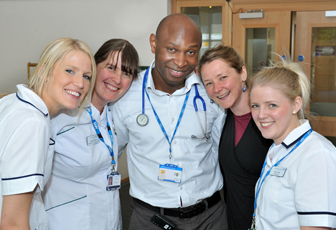Physiotherapy (Adult)
What we do
Physiotherapy is beneficial for people of all ages to restore physical movement, function and self-confidence after someone has been affected by injury, illness or disability.
Physiotherapy can also help to reduce your risk of injury or illness in the future.
Physiotherapy can help problems affecting:
- bones, joints and soft tissue – such as back pain, neck pain, shoulder pain and sports injuries
- brain & nervous system – such as movement difficulties resulting from a stroke, multiple sclerosis (MS) or Parkinson's disease
- heart & circulation – such as rehabilitation after a heart attack
- lungs & breathing – such as chest infection, chronic obstructive pulmonary disease (COPD) and cystic fibrosis
- urinary & bowel problems – such as after surgery or continence problems.
Inpatient physiotherapy:
Physiotherapy is provided on all hospital wards and in A&E at Warwick, Stratford-Upon-Avon, Leamington & Ellen Badger Hospitals to help patients recover physically after injury, illness or surgery and encourage you to maintain or improve your functional ability.
Nursing or medical staff refer patients to the ward Physiotherapy Team and the therapist assesses and treats as necessary. Outpatient physiotherapy:
Outpatient physiotherapy:
We provide multiple outpatient clinics across Warwickshire. Services are divided into specialities:
musculoskeletal physiotherapy neurological physiotherapy men’s and women’s health (continence) complex pain management respiratory SWIMSpulmonary rehabilitationTo access outpatient physiotherapy you must to be referred by a medical practitioner (ie a GP or consultant).
You can refer yourself for musculoskeletal (only) physiotherapy using the self referral form in the section below. Please note for all other specialities you must be formally referred by a medical practitioner.
| Please note we do not accept referrals if the problem has been treated with Physiotherapy in the last 6 months, or for OT hand and wrists assessment, please contact your GP for further guidance. |
Useful exercises
Below are some information booklets from Versus Arthritis that provide general advice on different types of pain. Within them you can find some exercises that you may find beneficial.
The Chartered Society of Physiotherapists (CSP) also provide some exercise booklets and online videos to help manage various muscle and joint problems. The following are booklets you can download and save.
If you prefer to watch a video instead click on one of the links below, which will take you to CSP's website to view them.
Patient information leaflets
Related links
To self refer please complete the self referral criteria and form application. Allow 5 working days before contacting Therapies for an appointment.
Please note we do not accept referrals if the problem has been treated with Physiotherapy in the last 6 months, or for OT hand and wrists assessment, please contact your GP for further guidance.
Address:
Physiotherapy
Warwick Hospital
Lakin Road
Warwick
CV34 5BW
Email: therapies@swft.nhs.uk
Contact number for all clinics: Tel: 01926 600818 option 5
You will have a formal assessment by either a male or female physiotherapist.
This can take up to an hour and involves thorough questioning about your problem, your general health and lifestyle. It is helpful to bring a list of any tablets or medicines that you take regularly.
All information is confidential between you and your physiotherapist. It is likely that you will need to undress so that the physiotherapist can examine the affected area. The examination may involve touch.
At the end of the assessment your physiotherapist will discuss their findings with you and their treatment recommendation. Treatment could consist of exercises, manual treatment or electrotherapy, as well as education and advice. You will be given an opportunity to ask questions and be involved in deciding with the physiotherapist which treatment will be used.
« Return to Adult out-of-hospital services







